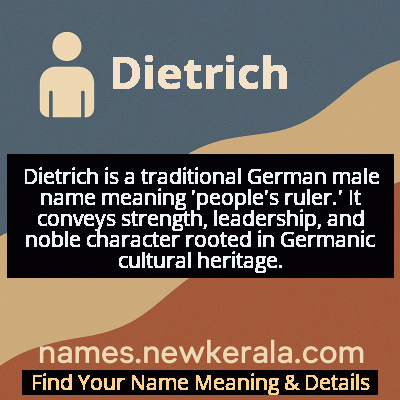Dietrich Name Meaning & Details
Origin, Popularity, Numerology Analysis & Name Meaning of Dietrich
Discover the origin, meaning, and cultural significance of the name DIETRICH. Delve into its historical roots and explore the lasting impact it has had on communities and traditions.
Name
Dietrich
Gender
Male
Origin
German
Lucky Number
4
Meaning of the Name - Dietrich
Dietrich is a traditional German male name meaning 'people's ruler.' It conveys strength, leadership, and noble character rooted in Germanic cultural heritage.
Dietrich - Complete Numerology Analysis
Your Numerology Number
Based on Pythagorean Numerology System
Ruling Planet
Uranus (Rahu)
Positive Nature
Strong sense of order, loyal, practical, and disciplined.
Negative Traits
Stubborn, overly serious, rigid, and prone to feeling restricted.
Lucky Colours
Blue, gray.
Lucky Days
Saturday.
Lucky Stones
Blue sapphire.
Harmony Numbers
1, 7, 8.
Best Suited Professions
Managers, engineers, accountants, organizers.
What People Like About You
Dependability, discipline, practicality.
Famous People Named Dietrich
Dietrich Bonhoeffer
Theologian and anti-Nazi dissident
Executed for his resistance to Hitler's regime; wrote influential theological works
Dietrich Fischer-Dieskau
Baritone singer
Considered one of the greatest Lieder singers of all time
Dietrich Mateschitz
Businessman and entrepreneur
Co-founded Red Bull GmbH and created the global energy drink market
Dietrich von Choltitz
German General
Disobeyed Hitler's order to destroy Paris, saving the city from destruction
Name Variations & International Equivalents
Click on blue names to explore their detailed meanings. Gray names with will be available soon.
Cultural & Historical Significance
In modern times, Dietrich gained new layers of meaning through historical figures like Dietrich Bonhoeffer, whose moral resistance to Nazism transformed the name into a symbol of ethical courage and intellectual integrity. This evolution demonstrates how traditional Germanic values can manifest in contemporary moral leadership. The name continues to represent a bridge between Germany's ancient cultural heritage and its modern identity, embodying both historical depth and progressive values.
Extended Personality Analysis
Men named Dietrich are typically perceived as possessing strong leadership qualities combined with deep moral conviction. They often exhibit a natural authority that commands respect, yet they tend to lead through example rather than domination. Their decision-making is usually thoughtful and principled, reflecting the name's meaning of 'people's ruler'—suggesting leadership that serves the community rather than personal ambition.
Dietrichs are generally seen as reliable, traditional, and somewhat reserved individuals who value stability and order. They often possess strong analytical skills and practical intelligence, making them effective problem-solvers in professional settings. While they may appear formal or serious at first meeting, those who know them well appreciate their loyalty, dry wit, and steadfast character. This combination of strength, integrity, and quiet competence makes Dietrichs particularly suited to roles requiring both leadership and ethical judgment.
Modern Usage & Popularity
In contemporary usage, Dietrich has become less common as a first name for newborns in German-speaking countries, though it maintains strong presence as a surname and middle name. It's currently considered a classic, traditional name that carries connotations of education, heritage, and upper-middle-class background. While its popularity peaked in the early 20th century, it still appears occasionally in families seeking to honor German cultural traditions or family lineage. The name's association with notable historical and contemporary figures ensures it remains recognizable and respected, even as naming trends have shifted toward more modern or international options. Outside German-speaking regions, Dietrich is rarely used except in families with strong German heritage connections.
Symbolic & Spiritual Meanings
Symbolically, Dietrich represents the ideal of principled leadership and moral courage. The name evokes images of both medieval Germanic heroes and modern resistance figures, symbolizing strength that serves higher purposes rather than personal ambition. It carries connotations of tradition, reliability, and intellectual depth, suggesting someone who respects heritage while capable of independent moral judgment. The 'people's ruler' meaning transforms into a metaphor for service-oriented leadership and community responsibility. In a broader cultural context, Dietrich symbolizes the German ideal of combining strength with Bildung—the concept of cultivated education and moral development—creating a powerful archetype of the thoughtful, principled leader.

